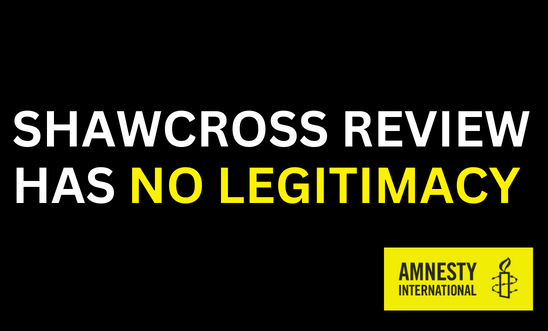
Press releases
UK: Shawcross review of Prevent is 'deeply prejudiced and has no legitimacy'

Controversial counter-terrorism programme overwhelmingly directed at children and young people
Review led by William Shawcross who has a history of making anti-Muslim statements
‘The review is riddled with biased thinking, errors and plain anti-Muslim prejudice’ – Ilyas Nagdee
Amnesty International strongly criticises the review of the UK’s counter-terrorism Prevent duty published today (8 February).
Ilyas Nagdee, Amnesty International UK’s Racial Justice Director, said:
“This review is riddled with biased thinking, errors, and plain anti-Muslim prejudice - frankly, the review has no legitimacy.
“William Shawcross’ history of bigoted comments on Muslims and Islam should have precluded his involvement in this ill-starred review in the first place.
“There’s mounting evidence that Prevent has specifically targeted Muslim communities and activists fighting for social justice and a host of crucial international issues – including topics like the climate crisis and the oppression of Palestinians.
“There is growing evidence that Prevent is having disastrous consequences for many people; eroding freedom of expression, clamping down on activism, creating a compliant generation and impacting on individual rights enshrined in law.
“A proper independent review of Prevent should have looked at the host of human rights violations that the programme has led to - but these have largely been passed over in silence."
Last year, Amnesty joined a coalition of 17 human rights and hundreds of community groups in a boycott of the Shawcross-led review, citing serious concerns about bias and a pattern of behaviour which demonstrated the Government’s unwillingness to seriously interrogate the Prevent Duty.
Prevent: Children and young people targeted
Devised in 2003 by the Government, there is ever-mounting evidence that Prevent, the controversial counter-terrorism strategy, is discriminatory and disproportionately targets Muslims - specifically children and young people.
The indicators of extremism used to refer thousands of young people to Prevent include if they display behaviours such as a sense of adventure or if they change their appearance - these should not be considered indicators of extremism because they are the behaviours of an average teenager.
Data released last month shows that in the year leading to March 2022, only 13% of Prevent referrals are taken forward as cases by the Government resulting in thousands of young people put through daunting referrals impacting their mental health, trust in schools, hospitals and other important bodies. This trend of referrals has existed for years and has been attributed to Prevent having a wide scope for discretionary interpretation, which was criticised by multiple UN Special Rapporteurs including E. Tendayi Achiume, former Special Rapporteur on contemporary forms of racism, racial discrimination, xenophobia and related intolerance, in her visit to the UK in 2019.
Numerous reports published by civil society groups, academics and UN Special Rapporteurs have highlighted the way Prevent has transformed nurseries, schools, universities, hospitals, and other key sites of social welfare into sites of discrimination, racism and exclusion.
Several child referrals to Prevent confirm the significant stereotypes made relating to their racial and religious background. These cases which appear in the People's Review of Prevent include:
"Joel", a 16-year-old boy described by his mother as “quiet” and “not very interested in religion” was referred to Prevent for trying to take out books from the library, one of which included a book about terrorism. Joel’s mother said:
“The school only reported the book that Joel tried to take out of the library, and I am shocked that the school would make a Prevent referral based on a book that they have on their own shelves.”
Four-year-old "Zak" told a staff member at his after-school club that his father had “guns and bombs in his shed”, referring to the video game Fortnite. The staff member did not say anything to the mother when she collected him that evening. Instead, the school followed Prevent procedures and reported the incident to the police. The mother said:
“It could have gone really wrong. I worry armed police could have come to my house and, you know, arrested the parents, with social services getting involved.”
The controversial appointment of William Shawcross, former Chair of the Charity Commission, as the reviewer of Prevent is especially problematic given his history of making prejudiced remarks about Islam, such as “Europe and Islam is one of the greatest, most terrifying problems of our future”.
Shawcross was appointed in January 2021 after the Government was forced to drop Lord Carlisle due to his history of supporting Prevent.
Delayed for three years, the findings from the Shawcross review contradicts the People’s Review of Prevent which has accused Prevent of being ineffective, disproportionate, and discriminatory.